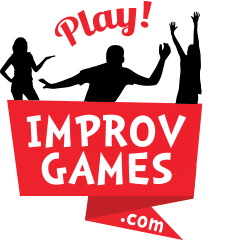Quick Description
Players take turns telling a story starting each sentence with either “fortunately” or “unfortunately”
How to Play
Players create a straight line or stand in a circle.
The starting player makes a statement.
The next player tells the next part of the story by starting with “fortunately” or “unfortunately”.
The next player continues the same story starting with the alternate word.
Continue until everyone has contributed something to the story.
Example:
Starting Player: Jamal likes playing improv games
Next player: Fortunately Jamal has a great group of friends to play with.
Next Player: Unfortunately they are never around.
Next Player: Fortunately Jamal plays with friends on-line.
Next player: Unfortunately Jamal doesn’t have a good internet connection
….and so on.
Notes
- It can be a fun game for all ages.
- This is an anti-narrative game as it destroys (or is negative) to the previous part of the story.
- It can be useful to notice where the laughs come from.
- It can be used to remind the players that it is their choice to go positive or negative.
- Could be useful to ask the players which word they prefer to use.
- Ask the players what their feelings were when the next player added their piece.
Variations
You can play it in pairs.
You can start with “Once upon a time…”
Use the phrases ‘good new’ and ‘bad news’.
Use it as a training activity or a performance game.
Randomize the fortunately/unfortunately with a deck of cards. Red = Fortunately. Black = Unfortunately.
Look at the video below to see how it can be used for Applied Improvisation.
Origin
I learned Fortunately/Unfortunately from Rebecca Stockley at BATS Improv .

Get the Playbook so you have hundreds of games in your pocket when you need them.

